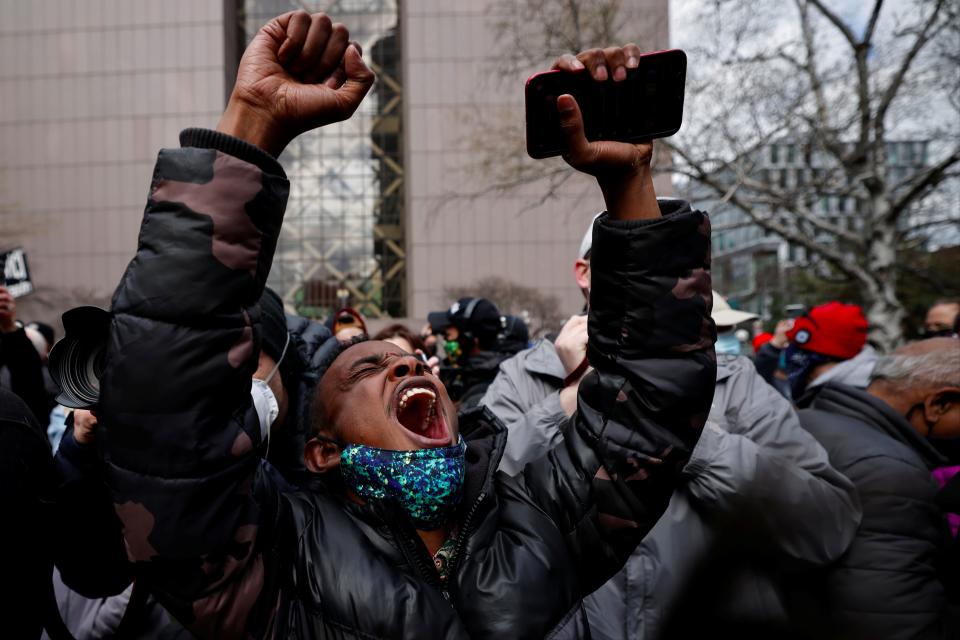Former police officer Derek Chauvin found guilty of murdering George Floyd

Derek Chauvin has been convicted of murder for killing George Floyd by kneeling on his neck for more than nine minutes.
The former Minneapolis police officer’s crime prompted a wave of protests in support of racial justice in the US and across the world.
The jury unanimously convicted Chauvin of all the charges he faced - second and third degree murder, and manslaughter.
They concluded that the white former officer killed the 46-year-old black man through a criminal assault by pinning him to the ground so he could not breathe properly.
The verdict amounts to a milestone in the fraught racial history of the US and a rebuke of law enforcement's treatment of black Americans.
Outside the courthouse, a crowd of several hundred people erupted in cheers. Chants of "George Floyd" and "All three counts" broke out.
At George Floyd square in Minneapolis, the intersection where Mr Floyd was killed and is now named after him, people screamed, applauded and wept.
A lack of oxygen caused Mr Floyd brain damage, heart failure and death, the jury found.
Chauvin faces up to 40 years in prison following the killing in May last year.
The verdict was reached by jurors on Tuesday after deliberating for about 10 hours over two days in a city on edge against another outbreak of unrest.

Chauvin showed little reaction beyond his eyes darting around the courtroom as the verdict was read to the court.
His bail was immediately revoked and he was led away with his hands cuffed behind his back.
The jurors' identities were kept secret and will not be released until the judge decides it is safe to do so.
“Justice for Black America is justice for all of America,” the Floyd family’s attorney Benjamin Crump said in a statement.
“This case is a turning point in American history for accountability of law enforcement and sends a clear message we hope is heard clearly in every city and every state.”
Three other former Minneapolis officers charged with aiding and abetting murder in Mr Floyd's death will stand trial in August.
Mr Floyd died on May 25 after being arrested on suspicion of passing a counterfeit 20 dollar bill for a pack of cigarettes at a corner market.
He panicked, pleaded that he was claustrophobic and struggled with police when they tried to put him in a squad car. They put him on the ground instead.
The centrepiece of the case was the bystander video of Mr Floyd gasping repeatedly, "I can't breathe" and onlookers yelling at Chauvin to stop as the officer pressed his knee on or close to Mr Floyd's neck for what authorities said was nine-and-a-half minutes.
Prosecutors played the footage at the earliest opportunity, during opening statements, with Jerry Blackwell telling the jury: "Believe your eyes."
And it was shown over and over, analysed one frame at a time by witnesses on both sides.
In the wake of Mr Floyd's death, demonstrations and scattered violence broke out in Minneapolis, around the country and beyond. The furore also led to the removal of Confederate statues and other offensive symbols such as Aunt Jemima.
In the months that followed, numerous states and cities restricted the use of force by police, revamped disciplinary systems or subjected police departments to closer oversight.
Chauvin attorney Eric Nelson called a police use-of-force expert and a forensic pathologist to help make the case that Chauvin acted reasonably against a struggling suspect and that Mr Floyd died because of an underlying heart condition and his illegal drug use.
Mr Floyd had high blood pressure, an enlarged heart and narrowed arteries, and fentanyl and methamphetamine were found in his system.
Under the law, police have certain leeway to use force and are judged according to whether their actions were "reasonable" under the circumstances.
The defence also tried to make the case that Chauvin and the other officers were hindered in their duties by what they perceived as a growing, hostile crowd.
Former US president Barack Obama said the conviction was correct, but is only one step in the fight for justice.
He said that true justice requires Americans to understand that “black Americans are being treated differently every day” and that millions live in fear that their next encounter with law enforcement could be their last.
Mr Obama said the country needs to follow up on the verdict by taking concrete steps to reduce racial bias in the criminal justice system and to redouble efforts to expand economic opportunity in marginalized communities.
Earlier, President Joe Biden, Vice-President Kamala Harris and first lady Jill Biden called members of the Floyd family moments after the verdict, according to video posted by family attorney Ben Crump.
Mr Biden told the family: “Nothing is going to make it all better, but at least now there is some justice.”
He added: “We’re all so relieved.”
Mr Biden said he hoped the verdict would give momentum to congressional police reform efforts.
According to the White House, Mr Biden and Ms Harris watched the verdict live from the private dining room just off the Oval Office.
Read More
Evening Standard Comment: Derek Chauvin verdict must be first step to justice
Sadiq Khan calls for ‘real change’ after Derek Chauvin convicted of killing George Floyd

 Yahoo Sport
Yahoo Sport 





































